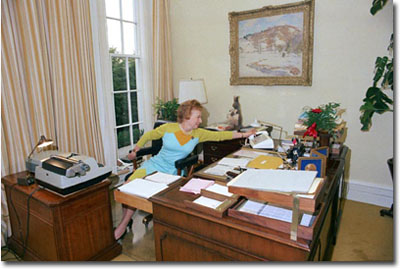Memories
With the rumblings by the White House to resist any congressional subpoenas, the Chicago Tribune's political blog, The Swamp, reprinted the following article on executive privilege:
And then, from Dick Polman's American Debate, "I'm sorry that the situation has gotten to where it's got," but now it's time to stonewall, there is this:"From Day One, the chief challenge facing this White House has been to place maximum distance between [the President] and his behavior. That strategy has succeeded, but only with the help of mighty assaults on our common sense.
"In order to exonerate the chief, aides have made fantastic claims: that they lied to their personal diaries, that Velcro-brained lawyers couldn't recall crucial incidents, that files vanished or moved from one place to another as if by magic, that scores of people with nothing to gain from lying nevertheless perjured themselves, and that this contagion of amnesia, sloppiness and venality was just the gosh darnedest series of coincidences ever witnessed by man or beast.
"The wall of separation between [the President] and his deeds remains strong because minions have stuck to their alibis. But now comes an episode in which the Man from Hope stands alone. It is his recent attempt to claim executive privilege. . . .
"[The President] can't blame his lawyers for this latest feint. He alone can assert the privilege. The maneuver places him at the heart of his administration's ongoing effort to use executive privilege as a way of concealing the truth about whether the president exposed himself. It is almost impossible to think of this as anything but a tactic to . . . pump as much venom as possible into the political system.
* * * *"What kinds of conversations does executive privilege protect?
"The courts have said a president generally can shield communications that reveal fundamental deliberative processes. That includes communications between aides as they try to develop recommendations for their boss.
"But protected conversations involve predictable categories: military, diplomatic or national security secrets or law-enforcement activities.
* * * *
"What are the limits on privilege?
"Earlier in this administration, [it was] decreed that the White House never would assert privilege in the face of a criminal investigation. He merely was reiterating long-standing executive-branch policy along those lines. President Ronald Reagan didn't invoke privilege in Iran-contra, and neither did [the first] President George Bush. . . .
"Evidently, [the President] wants to shield virtually any communications that take place within the White House compound on the theory that all such talk contributes in some way, shape or form to the continuing success and harmony of an administration. Taken to its logical extreme, that position would make it impossible for citizens to hold a chief executive accountable for anything. He would have a constitutional right to cover up.
"Chances are that the courts will hurl such a claim out, but it will take time.
Under the doctrine of “executive privilege,” internal White House business “is not subject to questioning by another branch of government….A president must be able to place absolute confidence in the advice and assistance offered by the members of his staff. And in the performance of their duties for the president, those staff members must not be inhibited by the possibility that their advice and assistance will ever become a matter of public debate.” If presidential aides were to testify in public on Capitol Hill, “the candor with which (their) advice is rendered, and the quality of such assistance, will be compromised and weakened.”Who authored the first article? Guess which political lefty:
"Sounds like you're reading an old column of mine,'' Tony Snow, the Bush administration's press secretary, said today, readily recognizing his nine-year-old words read back to him at a morning press gaggle in which Snow was arguing for Bush's right to protect the internal deliberations of his White House staff.And the second quote? Bush perhaps? As Dick Polman explains:
So spoke President Richard Nixon on March 12, 1973, as he sought to defy the congressional leaders who were seeking to subpoena Nixon aides and thus find out the truth about the Watergate scandal.If this is not eerie enough, there was also a report yesterday of a "gap" in the release of the records by the Justice Department in the US Attorney scandal -- an 18 day gap no less! See Talking Points Memo, who first reported it. As Editor & Publisher said, in Paging Rose Mary Woods: '18-Day Gap' in Release of Latest Emails in 'AttorneyGate':
As each day passes, the phrase "shades of Watergate" appears more and more often in the press regarding the conflict surrounding the recent firing of eight U.S. attorneys. There was the hiring of former Nixon legal adviser Fred Fielding (he was once rumored to be Deep Throat) by President Bush, the selective release of documents, the threat to oppose subpoenas -- and now something reminiscent of the famous "18 1/2 minute gap."Brings to mind this image of days past:
(Photo via Attytood)


No comments:
Post a Comment